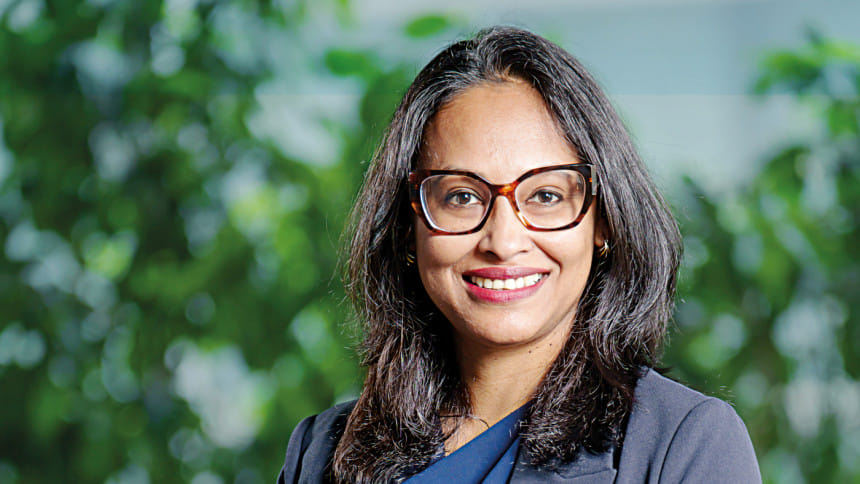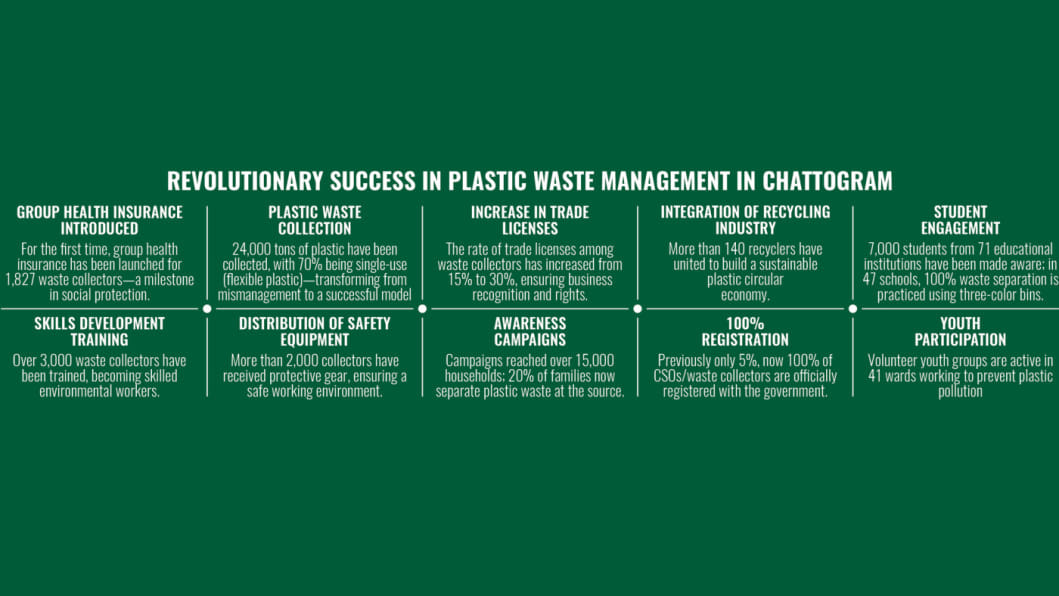We collect as much plastic as we use in Bangladesh

Shamima Akhter, Director of Corporate Affairs, Partnerships, and Communications at Unilever Bangladesh Ltd.
The Daily Star (TDS): Could you please share your insights on Unilever's approach to plastic management?
Shamima Akhter (SA): Unilever recognised the plastic challenge early and incorporated it into its global sustainability framework, which is built around four pillars: Climate, Nature, Plastic, and Livelihoods. Plastic is treated as a distinct pillar, reflecting our strong commitment to tackling plastic pollution as part of our sustainability agenda.
Although we began addressing plastic issues in 2015, our efforts significantly expanded from 2020, including in Bangladesh. Globally, there is growing acknowledgement that everyone has a role to play in reducing plastic pollution. We approach this challenge through three models: Reduction, Collection, and Circulation.
In Bangladesh, our conversations about plastic waste management began in 2019, and actual work on the ground started in 2020. The main challenge with plastic is that as virgin plastic use increases and collection systems remain inadequate, much of it ends up as waste. We don't sell plastic, but we use it to package products because it offers safety, durability, and cost-effectiveness. In fact, plastic's environmental footprint is often lower than many alternative packaging materials.
However, widespread overuse and improper disposal have created a significant problem. Plastic was originally designed for reuse, but today it's mostly single-use. But too much plastic is ending up in the environment, and our packaging is part of this problem. That's why our ambition is an end to plastic pollution through reduction, circulation and collaboration.
Reducing plastic means continuously minimising the amount we use through redesign and innovation. We strive to avoid plastic where possible and focus only on recyclable plastics—because if the plastic isn't recyclable, it can't be properly recycled. This focus on reduction is the first essential step in our plastic initiative.
TDS: What motivated your focus on plastic collection efforts?
SA: Collection is a critical part of effective plastic waste management. Globally, there is a shared understanding that producers must take responsibility for bringing their packaging back—this makes collection essential.
No single organisation can manage collection alone. It requires regulations, well-designed processes, and commitment to invest in collection systems. Plastic is reusable and recyclable, but without a strong recycling infrastructure, this potential cannot be realised. Such systems often do not develop naturally; they require active effort to build and improve.
Since 2020, we have been working actively in Bangladesh on these three pillars: reduction, collection, and recycling. We track our progress with scorecards across the entire value chain. The recurring World Environment Day theme, "Beat Plastic Pollution," highlights the urgency of this global issue.
Bangladesh recycles 37% of its plastic, well above the global average of 9%. This relatively high rate is largely due to the informal waste management sector. Informal waste workers form the backbone of this recycling ecosystem.
If we can support these workers by providing dignified jobs and improving their livelihoods, collection rates can improve further. Empowering this informal sector is vital to increasing recycling and achieving a more sustainable plastic waste management system in Bangladesh.
We call it an initiative because for every unit of plastic we use in our packaging, we commit to collecting an equivalent amount from the environment. As long as this commitment stands, we will continue this work.
Bangladesh's Solid Waste Management Rules clearly state that waste management is not solely the responsibility of the government—brand owners must also participate. Yet the country lacks a unified master plan. Different cities handle waste differently. Given our global target to collect more plastic than we produce by 2025, we felt the need to take the first step.
TDS: What motivated Unilever Bangladesh to launch a waste management initiative in Chattogram?
SA: Our journey began in 2020 with a project in Narayanganj City Corporation, partnered with UNDP, but we discontinued it after a year due to design issues. In 2022, we started work with YPSA in Chattogram—a city where much waste ends up in the sea. Chattogram's geography made it a strategic choice. The Chattogram City Corporation joined, creating Bangladesh's first tripartite waste management initiative involving a city corporation, a development actor, and a corporate entity.
By 2023, we collected as much plastic as we used annually, repeating this in 2024 and on track for 2025. Over these years, we engaged communities in 41 wards and integrated scrap dealers into the value chain.
Bangladesh recycles plastic bottles well, but flexible plastics are under-recycled due to contamination and low value. Our focus was efficiently collecting flexible packaging, which now makes up about 70% of our plastic collection—something never done before. We proved these polythene wrappers have recycling value, reducing pollution and increasing recycling.
Another success is working with existing value chain actors. Their livelihoods depend on this sector, so we designed incentives to encourage collecting better-quality plastic. We also improved their income and safety by providing training, safety gear, and medical insurance (added this year alongside life insurance through MetLife). These efforts have significantly improved the livelihoods of 3,000 waste workers.
Collaboration with Chattogram City Corporation is crucial. While we don't provide financial support, they monitor the waste management process and give us access to their infrastructure and waste workers. They revived ward-level waste management committees, which now verify collection data monthly and ensure waste workers receive incentives. This data is sent to a central database for certification. Consumer awareness is growing too, with opinion leaders and youth volunteers helping, as locals in Chattogram take pride in this initiative.
TDS: What are your future plans for plastic waste management and advancing sustainability efforts?
SA: Unilever is currently may be the only company in Bangladesh committed to collecting as much—or more—plastic than it uses. Each year, we're also reducing plastic use in different areas. But we are just one player. According to the World Bank, the largest source of plastic waste in Bangladesh is non-branded polythene, which doesn't enter any formal system. Solving this issue requires collective action and awareness across the entire ecosystem.
Looking ahead, we plan to continue our current efforts while strengthening two key areas. First, Extended Producer Responsibility (EPR) must be enforced. It's not enough for Unilever alone to act—other companies must participate. Broader involvement will bring greater impact. For example, we've already improved the livelihoods of 3,000 waste workers. If five more companies join, we could reach 15,000 workers and ensure job dignity at scale. We are working closely with the Department of Environment and other ministries to help implement EPR, which we see as a crucial step forward.
Second, globally, 60% of plastic waste is managed by the informal sector—this may be as high as 90% in Bangladesh. That's why we promote the idea of "socially just circularity." Recycling systems must also ensure the well-being of waste workers. We've introduced life insurance for them and are scaling efforts to improve their livelihoods further in 2024 and beyond.
Another focus is our "No Plastic" refill machine initiative. For the past two years, we've been working with refill technology and are now looking to scale it across Bangladesh. Lastly, we're ramping up consumer awareness campaigns. Source aggregation is essential for better recycling—but it requires both awareness and infrastructure. That's where government-corporate collaboration becomes vital.


 For all latest news, follow The Daily Star's Google News channel.
For all latest news, follow The Daily Star's Google News channel. 



Comments